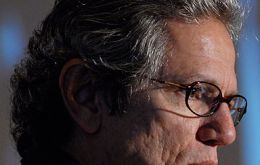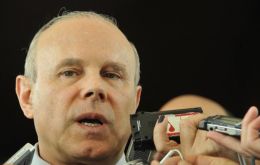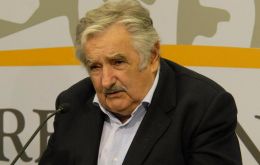MercoPress. South Atlantic News Agency
Tag: Guido Mantega
-
Monday, October 17th 2011 - 21:41 UTC
IMF says Brazil could experience flight of capital if Euro crisis worsens

Brazil could experience a flight of capital should the European sovereign-debt crisis worsen, and the country may use interest rates and US dollar reserves to combat contagion, an International Monetary Fund director said.
-
Saturday, October 1st 2011 - 05:54 UTC
Brazilian president calls on Central bank for “a cycle of interest rate reductions”

Brazilian President Dilma Rousseff made on Friday her strongest call yet for the central bank to continue cutting borrowing costs. At an event in Sao Paulo she said it was “inadmissible” for policy makers not to take into account the possibility of a recession and even a depression in the global economy.
-
Tuesday, September 27th 2011 - 01:39 UTC
Brazilian officials committed to protect the Real from international volatility

Brazil’s Finance Minister Guido Mantega returned home early from the IMF/World Bank meetings in Washington this weekend, after a plunge in the Real extended the world’s biggest currency slump over the past month.
-
Monday, September 26th 2011 - 06:27 UTC
The Economist analyzes trade restrictions (protectionism) in Argentina and Brazil

The Economist in its latest edition has a two-chapter piece on trade restrictions imposed by South America’s two biggest economies. The first (“Keep Out”) refers to Argentina and the second (“A self made siege’) to Brazil.
-
Thursday, September 22nd 2011 - 21:52 UTC
Brazil to the rescue of the Real which is down 17% against the dollar in 4 weeks

Brazil's central bank unexpectedly acted to halt the currency's slide on Thursday, highlighting growing concern among officials that the global financial crisis is damaging Brazil's economy and could cause a potentially destructive spurt in inflation.
-
Wednesday, September 21st 2011 - 00:49 UTC
Uruguay alert to the extent of Brazil recent measures on auto imports

Uruguayan president Jose Mujica admitted a certain ‘stinging feeling’ following the recent Brazilian decision to increase import taxes on vehicles by 30%, which could also have an impact on Mercosur partners.
-
Friday, September 16th 2011 - 07:05 UTC
Brazil increases tax on cars with high content of imported components

Brazil on Thursday raised a tax on cars with a high content of imported components to protect jobs following a surge in shipments from China and elsewhere that has been fueled by a rally in the currency.
-
Thursday, September 15th 2011 - 18:52 UTC
Lagarde to Mantega: BRIC offer should not be limited to EU safe bonds

The International Monetary Fund hopes investments in European bonds by the fast-growing BRIC (Brazil, Russia, India and China) economies are not limited to less risky government bonds such as German or British bonds, IMF managing director Christine Lagarde said in an Italian daily on Wednesday.
-
Wednesday, September 14th 2011 - 06:43 UTC
BRICS countries preparing aid package in support of the European Union

Brazil, Russia, India, China and South Africa, which make up the so-called BRICS group, will meet in Washington next week to discuss how to help the European Union avert a full-blown financial crisis as Greece veers toward default on its debt, Brazilian Finance Minister Guido Mantega said Tuesday.
-
Saturday, September 3rd 2011 - 00:46 UTC
Brazilian economy slowing down: growth drops to an annualized 3.1%

Brazil's economy expanded at a softer pace in the second quarter as a strong currency fueled a flood of cheap imports and industrial activity had its worst performance since the third quarter of 2009.
